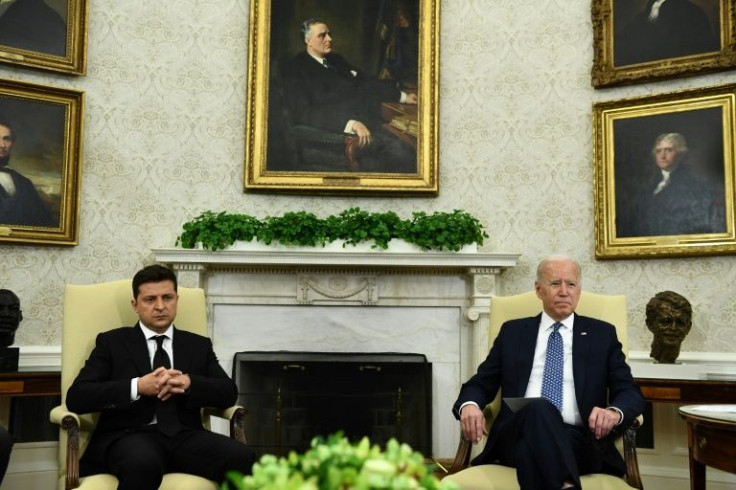'Calm Down The Messaging,' Ukraine's Leader Warned Biden Against Panic Mongering: Report
KEY POINTS
- Biden warned Ukrainian President Volodymyr Zelensky that an invasion is now virtually certain
- An official claimed Zelensky maintained that Ukrainian intelligence sees the threat differently
- White House disputed the Ukrainian official's claims, saying sources were "leaking' falsehoods"
President Joe Biden's warning to Ukrainian premier Volodymyr Zelensky that a Russian attack may be imminent did not sit well with the latter, who reportedly told Biden to "calm down the messaging."
A report by CNN, quoting an unnamed senior Ukrainian official, said the call between Biden and Zelensky on Thursday "did not go well" as both leaders had disagreements over the "risk levels."
The Ukrainian official reportedly described the call as "long and frank" wherein Biden said, "an invasion was now virtually certain, once the ground had frozen later in February."
However, Zelensky maintained that the threat from Russia remains "dangerous but ambiguous." He said it is not certain that an attack will take place and that the "Ukrainian intelligence sees the threat differently."
However, the White House disputed the official's version. National Security Council spokesperson Emily Horne told CNN that "anonymous sources are 'leaking' falsehoods."
"President Biden said that there is a distinct possibility that the Russians could invade Ukraine in February. He has said this publicly and we have been warning about this for months. Reports of anything more or different than that are completely false," Horne added.
The report also quoted an unnamed U.S. national security official, who said the call, which lasted an hour and 20 minutes, was "long and serious," but "productive." Biden told Zelensky that U.S. officials have assessed an invasion could potentially happen in February but did not say it definitely would, the official told CNN.
The readout of the call issued by the White House said "President Biden reaffirmed the readiness of the United States along with its allies and partners to respond decisively if Russia further invades Ukraine."
Biden also "underscored the commitment of the United States to Ukraine's sovereignty and territorial integrity" and added that the U.S. is "exploring additional macroeconomic support to help Ukraine's economy amidst pressure resulting from Russia's military build-up."
Zelensky tweeted after the call that he and Biden "discussed recent diplomatic efforts on de-escalation and agreed on joint actions for the future."
"Thanked President @JoeBiden for the ongoing military assistance. Possibilities for financial support to Ukraine were also discussed," the tweet read.
Had a long phone conversation with @POTUS. Discussed recent diplomatic efforts on de-escalation and agreed on joint actions for the future. Thanked President @JoeBiden for the ongoing military assistance. Possibilities for financial support to Ukraine were also discussed. pic.twitter.com/pAsQLYAuig
— Володимир Зеленський (@ZelenskyyUa) January 27, 2022
However, according to the senior Ukrainian official, Biden said Ukraine would not be offered significantly more military help. Zelensky, while urging Biden to "calm down the messaging," also warned him of the economic impact of the panic, CNN reported.
The report said the Ukrainian leader mentioned the recent talks with Russia in Paris, saying he pinned his hopes on a ceasefire agreement with rebels in eastern Ukraine.
While the Pentagon maintains that Russia continues its troop buildup on the border, many experts believe American intervention in the Russia-Ukraine crisis could quickly escalate into a nuclear conflict. Though the U.S. has said its forces would not be sent to defend Ukraine, there is no certainty that the situation wouldn't spin out of control resulting in a nuclear confrontation, said some experts.
"Nobody thinks any of these weapons are going to be used deliberately, but miscalculation is a significant chance," Des Browne, a member of the British Parliament and a former secretary of state for defense, told POLITICO.

© Copyright IBTimes 2024. All rights reserved.











